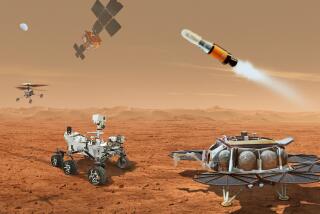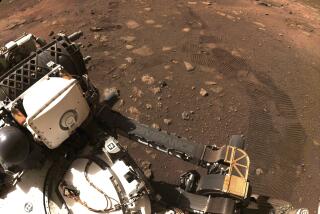Rovers Find Hints of Water in Soil Below Martian Surface
The first look beneath the Martian surface has shown that the soil composition changes dramatically with depth and hints that trace amounts of water have been present recently or may even be there now, researchers said Thursday.
The Opportunity rover has spent the last three days examining a 4-inch-deep, 20-inch-long trench it created with its front wheel in Meridiani Planum. Although the spectroscopic data have not yet been beamed back to Earth, microscopic images have presented puzzles for the team at Pasadena’s Jet Propulsion Laboratory to contemplate.
Pictures of the wall of the trench show it is composed of sand-sized grains of red rock cemented together. The cement could have been formed by minute amounts of water rising to the surface, bringing with it salts that would act as a cement, said JPL geologist Albert Yen.
The pictures of the wall show that small spherules present on the surface — nicknamed Martian blueberries — are also present underground, embedded in the matrix of the soil. To the team’s surprise, however, the underground spherules are brighter and shinier than those on the surface.
“We’re not sure what is going on here,” Yen said.
The bottom of the trench, in contrast, is so finely grained that individual grains do not show up in microscopic images, Yen said.
“The trenching has exposed a region that is completely different. [Opportunity’s instruments] will tell us what it is.”
Halfway around Mars at Gusev Crater, the Spirit rover wriggled its wheels slightly on the surface, revealing the top layer of soil to be much stickier than had been expected. “The surface layer is different from the layer underneath it,” said geologist Dave Des Marais of the NASA Ames Research Center, “and some stuck to the wheel. We’re very interested in why the surface material is sticky.”
One possibility is the presence of minute amounts of water, forming a brine or salty solution that is holding the soil together. If that is the case, the team expects to see relatively high concentrations of salts when they examine the soil with Spirit’s instruments. The amount of salt should decline below the surface, he said.
“We can have brines at very low temperatures,” Des Marais said. “And you don’t need very much water to explain these processes.”
The team plans to use Spirit’s front wheel either today or Saturday to excavate a trench similar to the one produced by Opportunity.
Spirit, which landed on Mars Jan. 3, is about halfway along its traverse to the Bonneville crater and is beginning to encounter more rocks that were thrown out when the crater was formed. Geologists hope those rocks will tell them more about the composition of the planet’s interior.
A final puzzle, but one that is perhaps more easily explainable, is the presence of extremely small, thread-like materials in some of the pictures. The material is thin and fractions of an inch to a couple of inches long.
“Before I would get too excited about something like this, I would recall that this vehicle landed using an awful lot of fabric, and that fabric took quite a beating,” said principal investigator Steven Squyres of Cornell University. “We have seen them, just a very limited number of them, and we’re puzzling it out.”
Opportunity’s cameras have shown clear evidence that the fabric of the air bags was shredded during its landing on Jan. 24, and Squyres said it would not be surprising to find fibers in the soil near the lander.
“I think the first thing we need to do is get a little farther away from what we know is stuff that we carried with us from Earth and see if we see these things,” he said. “I don’t know that these things are Martian.”






